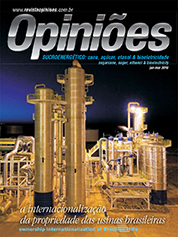Ismael Perina Junior
President of Orplana
Op-AA-23
Internationalization: a model that may increase the number of producers
Over the past few years, as a consequence of the globalization phenomenon, we have been watching true change in the behavior of companies in Brazil and the world. Specifically here in the country, we have seen large brand names being incorporated by large international networks. In the sugar-based energy industry, following the timid entry of some international groups in the past two years, we are faced with a considerable increase in this movement.
Right or wrong? It does not really matter, since the new reality is here, and comments about anticipated acquisitions are increasingly more common. One must take into consideration that the main accelerator of this process has been the energy issue, mainly the production of ethanol and electric power. Certainly other means that will become feasible in a short time period will bring about a true complex of renewable energy obtained from bagasse in in-dustrial units.
Such investments will support a new production model, in which the raw material, sugarcane, will be valued for the energy it contains and no longer for its sugar content. Thus, not only the juice will have economic value but also its fibers, which will be processed in the mills, and rather than depreciate the value of the raw material, they will be a factor of price aggregation.
One should bear in mind that these changes, and specifically in the case of internationalization, will imply both positive and negative aspects. In superficially assessing the implications for industrial units, it is certain that they will be strengthened through the formation of conglomerates, the advantages of economies of scale and the increase in “firing power” in negotiations.
Even with production taking place in different industrial units, there are actually good chances of reducing cost. The fact that they are multinational companies reduces pressures against the entry of Brazilian products in rich countries. Certainly companies of this size will know how to better manage inventory and this, of course, will bring about the reduction of price volatility, resulting in benefits both for producers and consumers.
These are some of the benefits achieved. One should not forget that, among the negative aspects that will surely appear, perhaps the most damaging will be the concentration effects, mainly with respect to the decrease of jobs and hence, less income distribution. In this respect, it is important to remember that, apart from acquisitions that have been occurring with investments in new projects, this problem will partially be minimized, and the figures tend to improve.
In assessing the implications for independent sugarcane producers, which should be the focus of my analysis, I believe we will experience some modifications. The internationalization of mills, in combination with a more diversified production mix, will perhaps require the development of a payment model that, like stated before, considers the energy contained in sugarcane.
I also believe that, as has been occurring in several operational multinational companies, the alternative of outsourcing the production of sugarcane to larger numbers of producers or groups of producers should be adopted, allowing them to achieve economies of scale and improve performance, also contributing to comply with the dates set for eliminating the practice of burning sugarcane straw.
Two aspects will be very important for sugarcane producers. First, that default rates of industrial units vis-à-vis producers, which have been quite high in recent times, will decrease quite considerably. These companies, being large conglomerates, over the years, have shown they pay on time. Second, that raw material prices will be valorized, given that companies will not sell their production at any price as happened on several occasions in the past three years, mainly due to the experienced crisis.
Certainly other difficulties will appear, but also the profile of these new companies will be more slated to industrial production. Therefore, perhaps this will be a model that may increase the number of producers, allowing for better income distribution within the production chain, a fact I deem essential for the development of the industry and, quite frankly, of Brazil.




